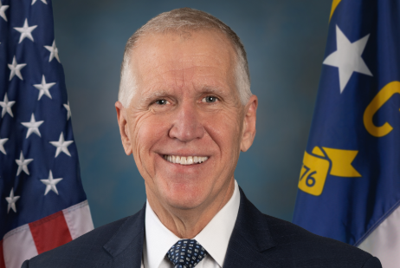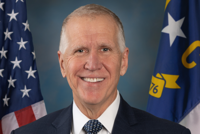
Tillis
WASHINGTON - Republicans in Congress have targeted the multibillion-dollar litigation funding industry with proposed new taxes and accusations of foreign interference in U.S. energy and technology markets.
The biggest threat currently facing third-party litigation funding, or TPLF, is a provision in the Senate version of President Trump’s One Big Beautiful Bill that would more than double the taxes on TPLF proceeds. Litigation funders provide money to pay lawyers and experts in hopes of reaping a percentage of any winnings.
Right now, those payouts are treated as capital gains with a maximum 20% rate. The proposed change would raise that to 41% and include foreign investors and sovereign wealth funds now largely exempt from U.S. taxes.
Shares in Burford Capital, the world’s largest TPLF firm, plunged 14% on June 17 after news broke that the Senate had added the tax to the budget reconciliation bill, incorporating a proposal originally launched by Sen. Thom Tillis in May as the Tackling Predatory Litigation Funding Act.
In addition to direct investments, Burford manages the $1 billion Burford Opportunity Fund C LP, which is backed by an unnamed “sovereign wealth fund.” The world’s largest sovereign wealth funds are financed with oil and gas export revenue in nations like Norway, Abu Dhabi and Kuwait.
Republicans in Congress and in state governments are also attacking the TPLF industry over suspected ties to foreign interests that may be funding litigation to cripple the U.S. energy industry and collect information about high technology.
While evidence of such efforts is scant – at a Wednesday Senate hearing, David Arkush of Public Citizen called them “Chinese communist conspiracy theories, straight out of the 1950s” – most litigation-funding agreements are opaque and without question foreign entities invest in the business.
One target of Republican wrath is the U.S. Energy Foundation, a spinoff of a Chinese energy foundation that has distributed more than $780 million to hundreds of left-leaning environmental groups since 2020. Grants disclosed in the foundation’s most recent federal financial filing include $20 million to the Fund for a Better Future, which in turn funds advocacy groups like Priorities USA and Climate Power.
The Energy Foundation also gave $415,000 to the Southern Environmental Law Center and $325,000 to the Minnesota Center for Environmental Advocacy, which is providing legal support to a lawsuit seeking to block an oil pipeline in Wisconsin.
Sen. Ted Cruz accused environmental activists and their Democratic supporters in Congress of using Chinese money to undermine the U.S. economy. The only group he specifically identified was the Energy Foundation of China, from which the U.S. Energy Foundation was spawned in 2019.
The Chinese Energy Foundation is run by a former Chinese government official and funds groups including the Natural Resources Defense Council and the Rocky Mountain Institute.
“We’re witnessing right now a systematic campaign against American energy,” said Sen. Cruz at Wednesday’s hearing. “There is a coordinated assault by the radical left backed and paid for by the Chinese Communist Party.”
Democratic Sen. Dick Durbin said, “I don’t think it’s the Chinese motivating this. We’re looking for justice.”
Climate lawsuits are largely financed by environmental groups that pay the legal bills for private lawyers including Sher Edling who recruited state and local governments as plaintiffs in hopes of winning even larger fees on contingency.
Those lawsuits seek to cripple the oil industry with huge verdicts for supposedly misleading consumers about the global-warming effects of burning fossil fuels. So far, six state court judges have tossed these claims at early stages, though the supreme courts of Hawaii and Colorado have allowed cases in those states to proceed.
President Trump has issued an executive order forbidding any further climate litigation and went to court to enforce it against the attorneys general of Hawaii and Michigan. In turn, some AGs filed suit against Trump’s EO.
Oklahoma recently joined more than half a dozen states in passing legislation to require TPLF disclosure, including whether foreign money is involved. ExxonMobil has sued California Attorney General Bob Bonta, the Sierra Club and an Australian charity, alleging they worked together to sue over Exxon’s recycling business when the ultimate funder of the Australian charity is a mining magnate with competing businesses.
Bonta launched a recycling lawsuit against ExxonMobil the same day as environmental groups, the company complains.





